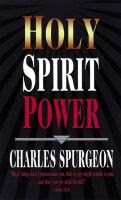Holy Spirit Power
 I just finished a classic work by Charles Spurgeon–a series of sermons on the work, the ministry and the person of the Holy Spirit compiled together to make up Holy Spirit Power. It’s a great read. I love reading Spurgeon’s material. His writing and preaching style of the mid-1800s was not as polished and charasmatic as many of his predecessors, but his content was next to none, rivaling even Puritan scholars. Holy Spirit Power is full of little bite-size takeaways that I know I’ll be using in future talks and teaching sessions. Here are a few that resonated with me:
I just finished a classic work by Charles Spurgeon–a series of sermons on the work, the ministry and the person of the Holy Spirit compiled together to make up Holy Spirit Power. It’s a great read. I love reading Spurgeon’s material. His writing and preaching style of the mid-1800s was not as polished and charasmatic as many of his predecessors, but his content was next to none, rivaling even Puritan scholars. Holy Spirit Power is full of little bite-size takeaways that I know I’ll be using in future talks and teaching sessions. Here are a few that resonated with me:
- “God does not give a fresh revelation, but He rivets the old one … He brings a fresh lamp to manifest the treasures hidden in Scripture … There is enough in the Bible for you to live on forever.” (p. 21)
- “There is not a minister living who can win a man’s heart by himself. He can win his ears and make them listen, and he can win his eyes and fix them upon him. He can win his attention, but the heart is very slippery.” (p. 42)
- “The grassiest paths and the most bewitching are the farthest away from right. The most enticing are those which are garnished with improper truths.” (p. 66)
- “I am persuaded that wherever there is a real work of grace in any soul, it begins with a pulling down. The Holy Ghost does not build on the old foundation.” (p. 91)
- ” ‘The words (of Scripture) are not inspired,’ some say. If we have no inspiration in the words, we have got an intangible inspiration that oozes away between our fingers and leaves nothing behind.” (p. 152)
- “God’s truth is safe, and we must be perfectly willing to be forgotten, derided, slandered, or anything else that men please. The cause is safe, and the King is on the throne. Hallelujah! Blessed be His name!” (p. 168)
That last bullet point is how Spurgeon concludes the book. And that one statement, “we must be perfectly willing to be forgotten, derided and slandered,” hit me like a ton of bricks. He’s exactly right. But that’s not a statement that tickles too many ears. That’s not a statement that we want to hear, especially in this present age–the age of pride and Twitter. (And I’m preaching to myself here) In an effort to feel like our lives matter to people, we put it all out there, whether it’s through our Facebook status, our blog, or whatever new pride-inducing social networking tool that comes along. And in a desperate attempt to keep our name alive, we participate in this never-ending game–a game we play to help people remember who we are–a game we play to make us feel important–a game we play that we might not be forgotten. But Spurgeon says, “we must be willing to be forgotten” so that Christ can be remembered. It’s His cause that matters. Not ours.
What are you doing that furthers His cause?